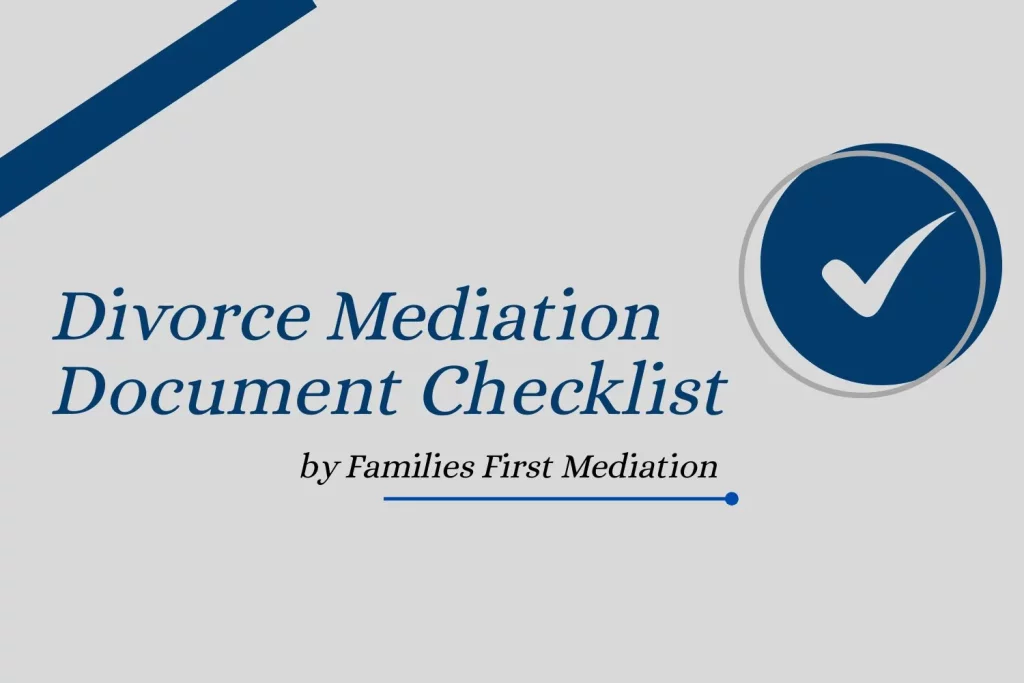
Providing Divorce Mediation Services Throughout California
Providing Divorce Mediation Services Throughout California
Home » Divorce and Family law Blog » Divorce Mediation Checklist: 90 Items & with free PDF

Divorce mediation in California is a cooperative process, in-expensive, and less stressful process than divorce litigation and collaborative divorce.
Some couples that mediate generally have an idea of how to resolve their matter; and others, have many places of disagreement. In either case, the mediator is skilled to assist the couple to get through their divorce efficiently and effectively with a high-quality agreement at the end.
Our divorce mediators have prepared a 90 Item essential divorce mediation checklist that outlines key topics and documents you will need for your divorce.
But at Families First Mediation, we also provide our couples a “Preparation for the First Working Session,” packet. This provides detailed instructions on how to prepare for the mediation; what documents are needed and how to disclose them; mediation ground rules; and even a secured location to upload the required financial documents.
Making sure that you prepare thoroughly, and that all important issues you wanted brought up are addressed.
Considering divorce mediation in California but unsure if it’s right for your situation or which path to choose? Schedule a FREE Divorce consultation with California’s top attorney mediator, Dina Haddad. She and her team would be more than happy to assist you.
Our printable, 90-item divorce mediation checklist can help you prepare better during your mediation session, leading to the productive and amicable divorce in California.
We have created a detailed checklist for spouses who want to seek productive and amicable divorce. The following are the eight checklist ideas to help you prepare better:
Before you get to your divorce mediation session in California, there are a few things you need to prepare:
Financial Documents: Tax returns, pay stubs, bank statements, credit card statements, mortgage documents, loan agreements, investment and retirement account statements, list of assets and debts.
Property Information: House deeds, vehicle titles, and appraisals for any valuable items you bought during the marriage.
Insurance Policies: Make sure to bring any health, life, auto, and home insurance details. If you don’t have them, reach out to your insurance companies and they can upload you a digital copy.
Employment Details: This is an important one, you will want to bring work contracts you are a part of and benefits information (especially if you are discussing spousal or child support).
Children’s Information: You will want to provide the accounts you have for your children, including 529 accounts.
For further questions about what else you should bring in your session, speak to our mediator. They would guide more comprehensively based on your situation.
Besides things that you should bring to your divorce mediation sessions, here is what you can write down in your divorce mediation checklist on things you will want to discuss:
General topics that you think must be discussed between you and your soon to be ex-spouse.
A postnuptial agreement if you got one after you two were married.
Discuss the terms of your prenup (if applicable) and what you already owned before marriage.
Assets and liability related information.
Child custody and parenting plans that are related to your divorce.
Property division and finances.
Alimony.
Final Agreement – will it be drafted for you as a Marital Settlement Agreement?
Insurance information regarding your life, car, or health plans. (which as said earlier, is why you should bring that information with you).
Tax return statements.
Stocks & bonds that you or your ex-spouse have invested into after you were married.
Areas of agreement that you and your ex-partner have already settled outside of mediation.
Divorce mediation can be a bit more complex for parents who are also seeking custody mediation. Have a look at our blog Do’s & Don’ts of Custody Mediation to get an idea of the basics.
Custody arrangement: who will have legal and physical custody, make sure to let the mediator know of your preferences and why you prefer them.
Parenting Schedule:
Regular Schedule
Summer Schedule/Summer Vacation
Holiday Schedule.
Child’s education: What does your school choice look like? If it’s not public school, what would be the costs? You can use mediation to discuss making this decision with your ex-partner.
Extracurricular activities: What kinds of outside of school activities will your child or children be participating in? What do the schedules look like and how will you split the cost with your co-parent?
Co-Parenting Agreements
Introduction to romantic interests
Access to firearms in the home
International travel
Travel outside the state of California
Make up time (especially if you travel for work)
Access to child during non-custodial time such as reasonable video and phone calls
When you are addressing financial support in divorce mediation, you need to make a plan around child support and alimony (spousal support).
Here is a checklist to guide your discussions:
Income documentation from both parties.
Calculation of child support based on California guidelines.
How long the support payments will remain in effect.
The payment schedule and method.
Health insurance coverage for children.
Sharing of uninsured medical expenses.
Childcare costs division.
Educational expenses for children.
Tax implications of support payments.
Conditions for modifying support.
Finances are a big discussion during divorce mediation. Your mediator will want to get you both to a place that you are equally well-off at.
This means that they will need to do a thorough examination of your financial situation. By providing these documents it will guarantee that your settlement is a fair one.
Real estate documents (deeds and/or appraisals)
Vehicle titles and valuations.
Personal property inventory.
Investment and retirement account statements.
Stock schedules for employee benefits like Restricted Stock Units, Performance Stock Units, and Stock Options.
Documentation of separate property claims.
Records of inheritances or gifts.
Tracing documents for any separate property claims (such as use of inheritance to a down payment of a house).
Tax returns from the last three years.
Employment contracts you are currently involved in and the benefit information for those.
Business financial records (if any).
Last two months of pay stubs.
Credit card statements.
Loan documents that you might have.
Your mortgage statements.
Debt repayment plans you are involved in.
Credit reports for both parties.
Life insurance policies you have.
Health insurance costs and policies.
Property insurance for your home.
Proof of ownership and your care arrangements for the pets involved.
Pet-related expenses like food, medical care, and grooming.
Bank statements for all accounts that you currently have open or have opened during the marriage.
Current budget and projected post-divorce expenses.
If you have them, any prenuptial or postnuptial agreements that have been signed.
We know there are several documents that come into play in divorce mediation. But these papers can provide important context and legal backing in your separation.
Find your marriage certificate and bring it with you to mediation.
Separation agreement if you and your ex-spouse have already drafted one.
Wills and trusts if you have already written your will.
Your power of attorney documents in the event something happened during the divorce.
Family business agreements or contracts.
Domestic partnership agreements (if you have one).
Consider the following to decide if you should mediate?
Both my spouse and I are willing to attend.
We want to keep our matter private.
We want to stay in control of our divorce (and not give that power to a judge).
We are willing to communicate or negotiate with one another.
We want to save time, money and our resources.
Divorce mediation can be an amazing way to resolve conflicts and find solutions to problems, but it’s not fit for every situation.
Before you decide that you want to go through with mediation sessions, you might want to self-evaluate and find out if mediation is appropriate for your circumstances.
Factors like power imbalances, domestic violence, or other extreme situations can impact if mediation is the best choice or not. In some cases, more traditional routes would be more appropriate. To learn more about if mediation is the right path for you, read our article When Divorce Mediation is Not Recommended.
To make sure that your divorce mediation process goes well, you should do your research. That way you can find the best mediator for your situation.
Learn about the mediator’s qualifications and experience: You can evaluate if your mediator is qualified to take on your divorce case.
Choose a divorce mediator that will work with your schedule. Do you need a remote service? Do you want it in person? .
Make a shortlist of mediators after some investigation: This way you can narrow down who you and your ex-partner feel comfortable sitting down with for mediation.
Schedule an initial consultation with each mediator on your shortlist: Talk to them more, find out if they are the right fit for you.
Finalize your selection and hire the best mediator that you find fit.
Here are some questions that you can ask your mediator in your FREE Divorce Mediation Consultation when looking for the right mediator:
For more frequently asked questions, visit our site Families First Mediation and have a look at some of our other blog posts.
The best divorce mediation service that you can find in California would be Families First Mediation. They have a combined experience of 60 years. They simplify your divorce, put you and your family first, save you from court stress, and save $10,000+ (on average) per couple.
They have a comprehensive working formula that has guaranteed happy clients through the years with their team of mediators who have over twenty years of family law experience. Their head mediator, Dina Haddad, can talk with you. Get a FREE Divorce Mediation Consult today.
In summary if you are currently going through divorce (or if you are even just planning one for the future. Make sure to go over our Divorce Mediation checklist if you plan on going through mediation.
It can help everyone involved to keep things smooth and straightforward. No one wants their divorce to drag on for months or years at a time comparable to traditional court.
Try to avoid making nearly impossible ultimatums or using accusatory language. Bringing up past grievances that are unrelated to the divorce can derail your session.
To survive divorce mediation, approach it with a calm and open mind. Try to keep your focus on compromising and making long-term solutions rather than going for short-term wins.
To prepare for divorce mediation in California, read through our checklist of things to gather before your mediation session.


Families First Mediation is a pioneer in the field of divorce mediation. Our entire divorce mediation team takes great pride in being active trainers, divorce mediators and teachers of mediation in the greater California area. If you are considering a collaborative divorce, legal seperation or looking for a san jose divorce lawyer we have services that may be beneficial to you. Take advantage of our vast expertise and background in the field of divorce mediation and our genuine desire to help with your divorce mediation services.